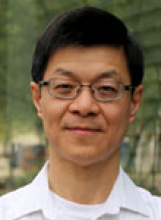Localization and Mitigation of Cascading Failures in Power Systems
Localization and Mitigation of Cascading Failures in Power Systems
Speaker Name:
Steven Low
Speaker Title:
Gilloon Professor at CMS/EE
Speaker Organization:
Caltech
Start Time:
Thursday, January 14, 2021 - 2:00pm
End Time:
Thursday, January 14, 2021 - 3:00pm
Location:
https://ucsc.zoom.us/j/93211154722?pwd=NGdXSXFGL1pjeE0rOUhTQ012QWhGQT09
Organizer:
Ricardo Sanfelice
Abstract
Line failure in power grid propgates in non-local, intricate and counterintuitive ways because of the interplay between power flow physics and network topology, making the mitigation of cascading failure difficult. The conventional approach to grid reliability is through building redundant lines. In this talk, we present an opposite approach to grid reliability through failure localization, by judiciously removing lines and adopting a new class of frequency control algorithms at real-time. The topology design partitions the network into regions that are connected in a tree structure. The frequency control automatically adjusts controllable generators and loads to minimize disruption and localize failure propagation. This approach is derived from a spectral representation of power flow equations that relates failure propagation to the graph structure of the grid through its Laplacian matrix. We summarize the underlying theory and present simulation results that demonstrate that our approach not only localizes failure propagation, as promised by the theory, but also improves overall grid reliability even though it reduces line redundancy.
Line failure in power grid propgates in non-local, intricate and counterintuitive ways because of the interplay between power flow physics and network topology, making the mitigation of cascading failure difficult. The conventional approach to grid reliability is through building redundant lines. In this talk, we present an opposite approach to grid reliability through failure localization, by judiciously removing lines and adopting a new class of frequency control algorithms at real-time. The topology design partitions the network into regions that are connected in a tree structure. The frequency control automatically adjusts controllable generators and loads to minimize disruption and localize failure propagation. This approach is derived from a spectral representation of power flow equations that relates failure propagation to the graph structure of the grid through its Laplacian matrix. We summarize the underlying theory and present simulation results that demonstrate that our approach not only localizes failure propagation, as promised by the theory, but also improves overall grid reliability even though it reduces line redundancy.
(Joint work with Daniel Guo, Chen Liang, Alessandro Zocca, and Adam Wierman)
Bio
Steven Low is the Gilloon Professor of the Department of Computing & Mathematical Sciences and the Department of Electrical Engineering at Caltech. Before that, he was with AT&T Bell Laboratories, Murray Hill, NJ, and the University of Melbourne, Australia, and have held an honorary professorship in Australia, China, and Taiwan. He is a Fellow of the IEEE and the ACM. He received his B.S. from Cornell and Ph.D. from Berkeley, both in EE.


